6 Simple Steps to Create a Budget That Works For YOU!
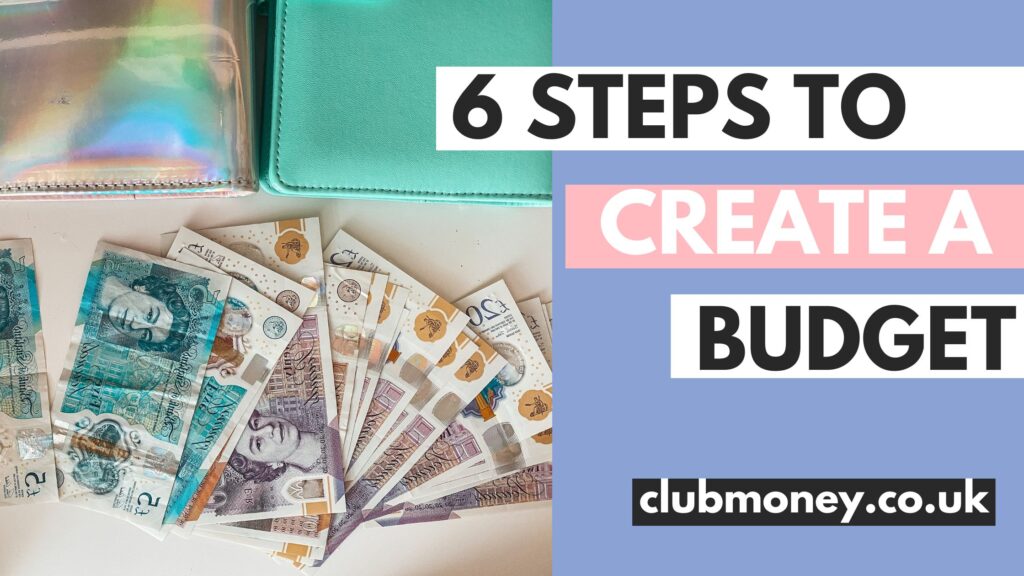
Here are my 6 Simple Steps to create a budget that works for YOU!
Let’s be real – budgeting really does have a bad rep.
When we hear the word budget it just does not in any way shape or form conjure up any sort of feeling of excitement. Like none.
In fact, it fills most of us with absolute dread. Its not a fun thought, the thought of creating a budget. Budgeting is just not sexy. There I said it.
BUDGETING IS NOT SEXY.
Seriously, who has ever woken up in the morning and thought “Good morning world, OMG, today is a great day to create a budget”
No-one has.. I know I haven’t, and I am guessing that the same goes for you?
But sometimes, budgeting is absolutely necessary – and it is actually there as a tool to help us get to where we need to get to with our financial goals.
So we really do need to stop giving budgeting such a hard time, if we make it part of our lives we will reap the rewards and avoid it less.
Look I get it, the word budget just sounds like punishment – and it can sometimes feel like it too. Like “all fun is cancelled around here until further notice. You must now budget.” Ewww gross.
So, here’s the real truth – and you may not want to hear it:
A good budget that works for you, does not and should not control you – it gives you control. Control over your life. Control over your finances. Control of your happiness.
If you have ever felt like you are genuinely terrible with money, or that your bank account goes straight back down to £0 the minute payday hits (or even into that overdraft) … then I promise you that you’re absolutely not alone in this.
This simple step by step guide is here to help you change that feeling of dread and overwhelm and really help you get your head around budgeting – without the use of spreadsheets, without any shame, or being boring AF.
Now, let’s get into it…
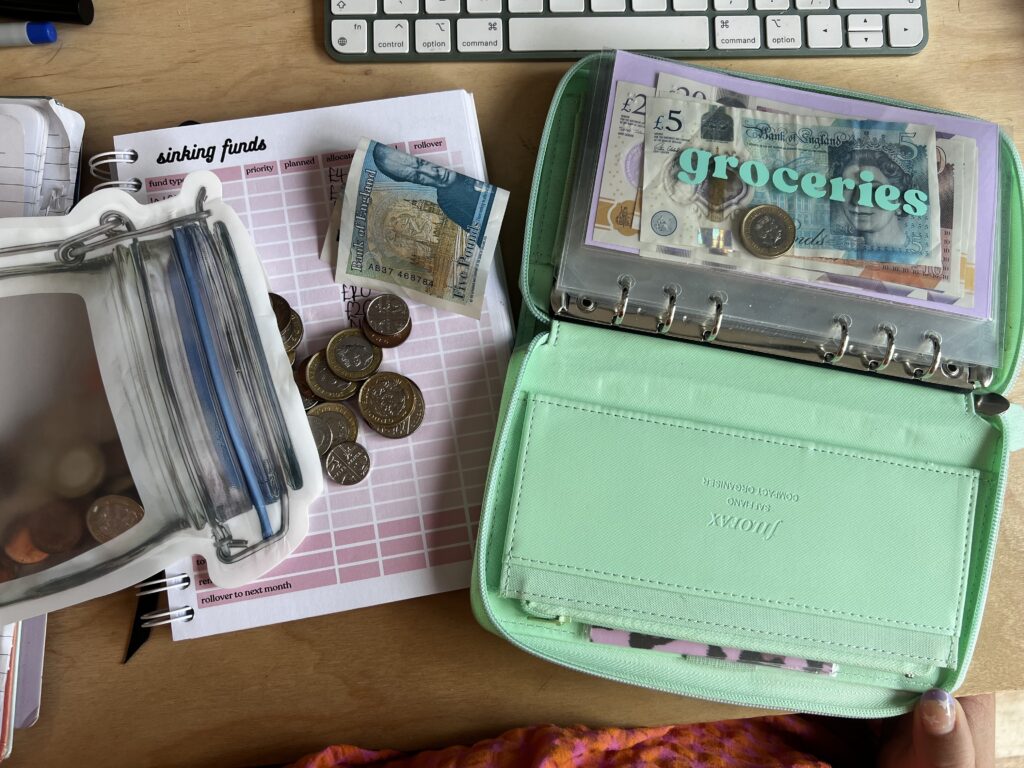
Step 1: Start With Your ‘Why’
Before we even begin to think about the numbers and create a budget that works for you, we have to get down with the nitty gritty and talk about your motivation.
Your reason for wanting to do this in the first place, your reason for ‘why’ you want or need to create a budget.
Your reason for creating a budget is completely personal to you and will no doubt be different to anyone else’s – and it should be. It’s your ‘why’.
Your desire to create a budget could be for one of the following reasons;
- To get yourself out of debt and into financial freedom.
- You want to clear that burdening overdraft once and for all.
- Saving for that special family holiday you have always dreamed about.
- Saving for a special occasion; wedding, milestone birthday etc.
- That house extension that has been spoken about for YEARS.
- Or to just simply stop feeling anxious every time your card hits the reader.
Top tip: The more specific you make your reason as to ‘why’ you want to create a budget in the first place, the more likely you will be to stick to it. You will have connected with your ‘why’ on a deeper level and that is so important.
Whatever your reason for wanting to create a budget is, write it down in as much detail as you can. Also, make sure you have it written down in multiple places. Have a photo saved on your phone/computer.
You want a constant reminder of your goal and why you are planning to create a budget, as when things get tough or you become unmotivated, you have that reminder of your goal that will help you reconnect and get you back on track.
Step 2: Track What’s Coming In and Going Out
Ok, now we have your ‘WHY’ figured out and your reason for wanting to create a budget we can move onto the next step…
In order to build a personalised budget just for you, you will need to start by knowing exactly what is happening with your money right now.
So, we need to track everything. And I mean EVERYTHING!
Warning: this is probably the most confronting part of the process and where so many people throw the towel in because they can’t handle seeing everything there written down in front of them in black and white.
Look, I get it. I have been there – and it was not nice or fun.
But once you know, then you know and you can start to do something about it.
You’ve got this!
What you need to track when you create a budget:
- All income streams: Wages, benefits, side hustle money, money from selling items
- Essentials: Rent, bills, transport, childcare, food shopping, petrol
- Non-essentials: Takeaways, subscriptions, shopping, hobbies, clothing
- Debts: Credit cards, overdrafts, loans
Top tip: Go through the last 2-3 months of your bank statements. Highlight every single transaction. You will probably spot a few “WTF” moments – we all do. You’ll probably also find a few “I have no idea what that is” too, where it takes you a minute to work out what the transaction was.
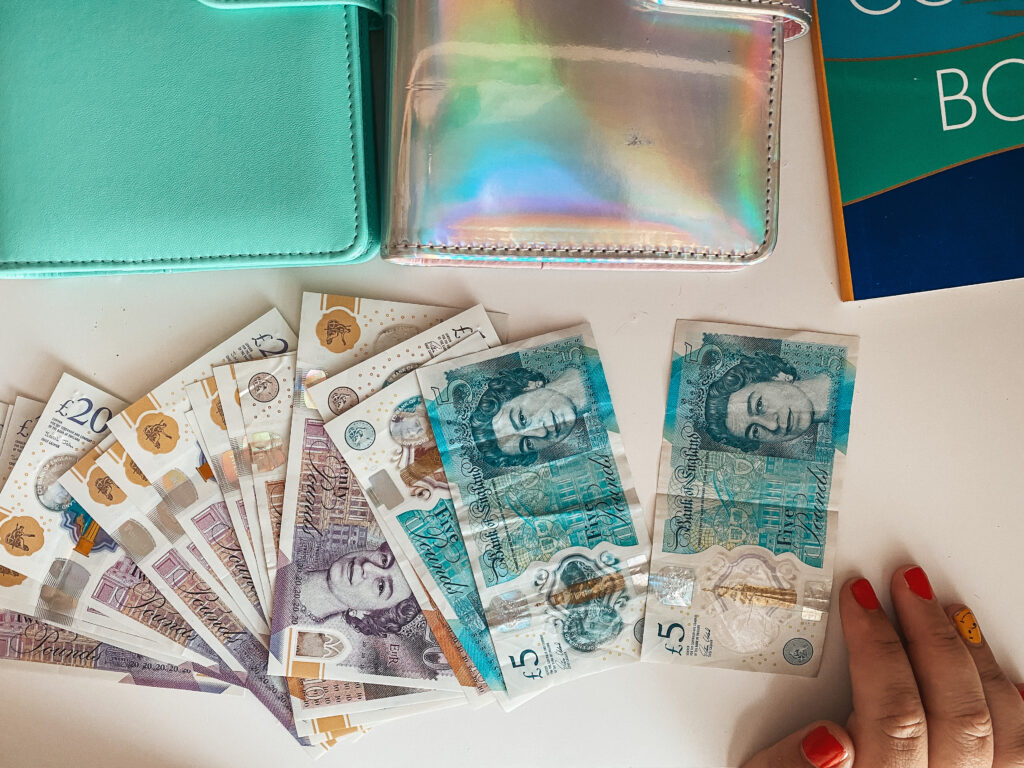
Step 3: Choose a Budgeting Method That Works for You
Not everyone loves spreadsheets (me neither tbh). In fact, most people run a mile as soon as they see one. They intimidate people – and that’s the last thing we want before you even start but if you do love a spreadsheet then I have a super useful and easy to use spreadsheet that will help you create a budget – I even use it myself!
The good news is: there’s no one right way to create a budget. It is not a one stop fix shop for all.
Have you ever heard of or tried one of these?
The 50/30/20 Method
- 50% Needs
- 30% Wants
- 20% Savings or debt
Zero-Based Budgeting
Every pound is assigned a job until you’re at zero. Good for control freaks (in a good way).
The Envelope/Bank Space Method
Put your money into “pots” (Monzo, Starling, etc.) so you physically separate it – no surprise overspending. You can use this method with Cash and Cash envelopes too. Simply assigning a space or an envelope to each area of your life and adding money when you can to them, either to get a bill paid, or save for an upcoming expense.
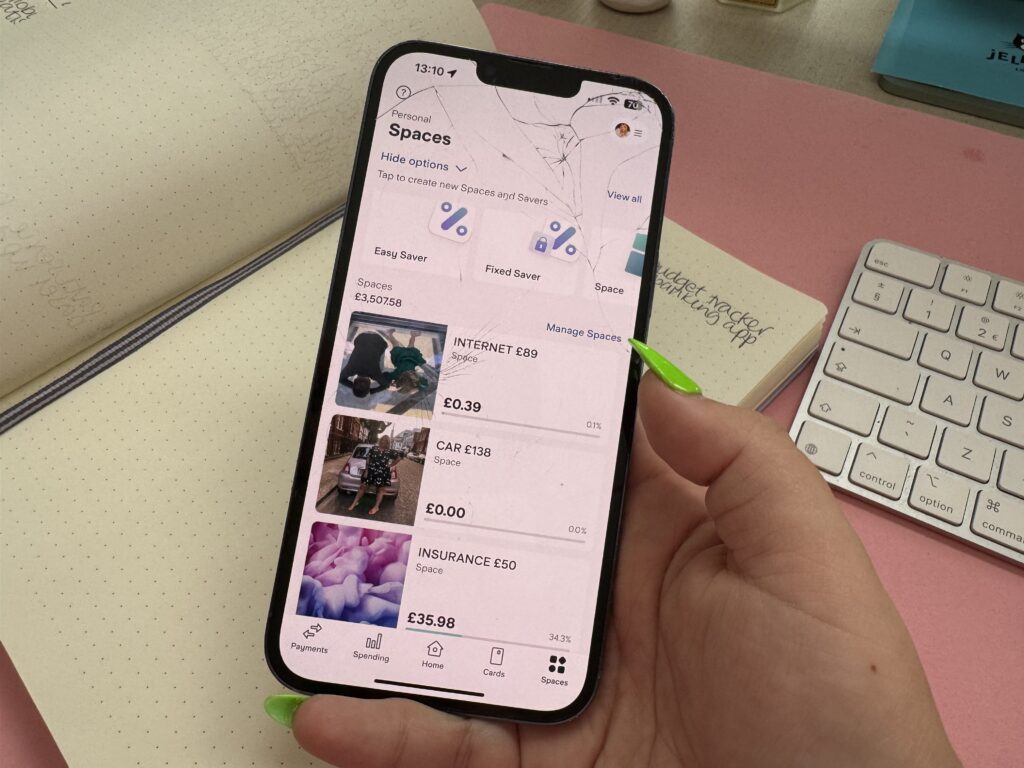
Step 4: Use Tools That Make It Easy
Like anything in life, tools are there to help you get a job done quicker and in a much more efficient and effective way. The exact same applies when it comes to budgeting.
Luckily for you, there are now so many budgeting tools out there that are designed to make budgeting so much easier for you by helping you to create a budget.
Your own bank may offer a budgeting tool within your online banking app, check it out to see if they offer such a service.
Check out the list below for some of the UK’s best budgeting tools.
Best UK Budgeting Tools:
- Monzo or Starling – great for setting spending limits and splitting money into pots
- Emma App – links to your bank and shows your spending habits
- Notion or Trello – if you prefer visual boards over numbers
- Printable budget trackers – if you’re a write-it-down type of person
Please do get in touch with us if you have any other suggestions that we have missed or maybe not heard of. We always love hearing about the ways in which you budget and manage your money.
Step 5: Cut Back Without Cutting Joy
As soon as we hear the expression ‘cut backs’ we automatically panic and prepare for the worst and begin to break into a sweat.
Well, I’m here to reassure you that there is literally no need for any of that!
But I cannot stress enough to you that this part of the process is so important.
Please listen to me when I say that if your budget feels like punishment, you won’t stick to it.
It’s that simple. Sure, you won’t always feel connected to your budget and some days will absolutely be tougher than others to stick to it, but it should never feel like a gruelling punishment. Some of us will have to budget very carefully for a long time in order to meet our goals, we need to make sure we can stick at this for the long term.
Here are some things to do that are easy wins to start with:
- Cancel any subscriptions you’ve forgotten about and/or don’t use
- Look at comparative deals and switch utility providers
- Set yourself a weekly spending cap for “fun” stuff and stick to it
Give every pound a purpose, but you still need to make sure you let yourself have some fun.
Budgeting should feel like empowerment, not punishment!
In the early days it can feel unmotivating and you can feel like giving up, but I promise you that you just need to stick with it.
When you start to see results and rewards from the budgeting I promise you that it fills you with more conviction to succeed – and you will succeed. You will get there. You have got this.
Step 6: Automate & Review Monthly
Set up direct debits for bills and savings. That way you don’t rely on willpower (spoiler: none of us have much).
Then set a monthly money date with yourself:
- Check your progress
- See what went wrong
- Adjust your plan without shame
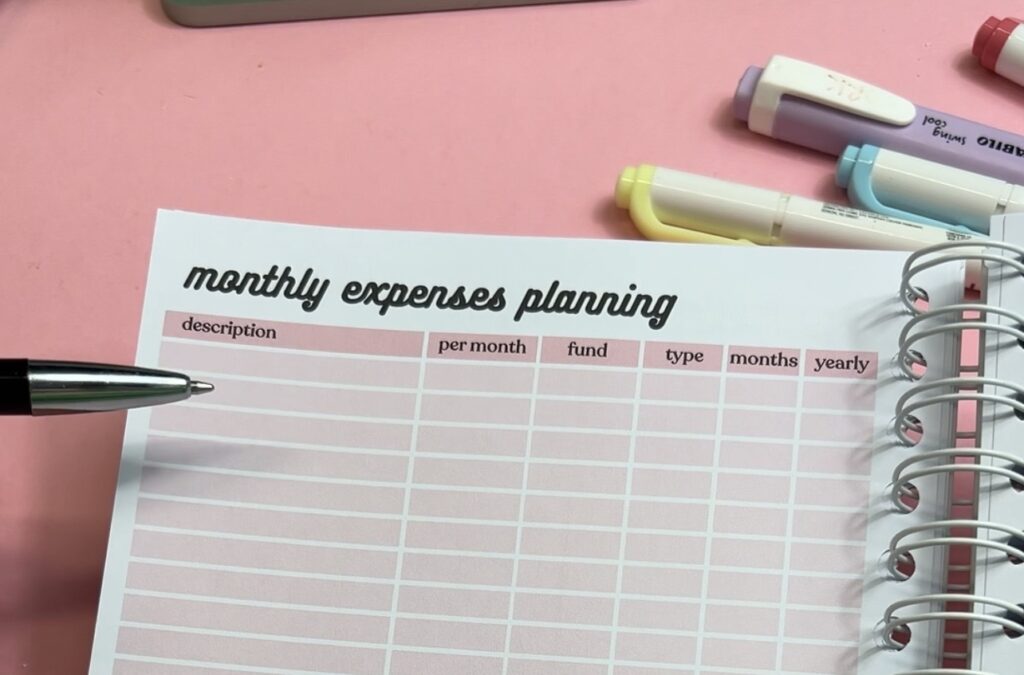
Final Thoughts:
You don’t need to be perfect. You just need to start.
You may have read through all of this and thought.. “Is that it? There’s not much to it, is there?!” or “Surely if it was that simple and easy then everyone would be doing it.”
Well, that’s just it… the steps themselves towards creating a personalised budget for yourself are in fact very straightforward.
A budget is simple and easy to follow. To create a budget is pretty simple. In theory.
It’s not until we really get into our budget that we get confronted with things.
Obstacles get in the way. Something throws us off – an event, an unexpected bill. We get bored of not seeing results. The process is too long. All of these things.
So we give up. We throw the towel in and tell ourselves it’s all too hard to create a budget or to even make the first step to start budgeting. Or that it’s just not for us, when in fact it is for us.
Budgeting is for all of us, it’s for anyone and everyone. It’s just about having the determination and willingness to want to do it and to really try and remain consistent with it.
Is it always going to be easy to stick to your budget? No, it’s not – and that is me being absolutely real with you.
But like I said before it should not feel like a punishment. As if it does then this is where you will encounter real problems.
Create a budget not to restrict yourself, but to use it as a tool to build the life you truly want. This isn’t about restriction.
If the thought of all of this feels overwhelming, then just know this:
You’re not bad with money – you just haven’t had the right tools (or support) until now.
Want to get better at budgeting, save more, and feel on top of your money? Join our free WhatsApp community for tips, tricks, and helpful links to make managing your money easier (and way less boring). It’s a supportive space for real people who want to spend smarter, not less. Come hang out with us – your future wallet will thank you!
Join our WhatsApp Community for weekly tips, tools & accountability.




Responses